- Home
- Matt Rogers
The Will Slater Series Books 1-3 Page 16
The Will Slater Series Books 1-3 Read online
Page 16
He shivered involuntarily.
34
The Toyota Land Cruiser shot out of Seiyun’s city limits at close to eighty miles an hour, kicking up a barrage of dust and sand behind it as it screamed through the otherwise ambient streets. At mid-afternoon, there was little commotion amongst the locals — in fact, it was near-peaceful as the working day ticked by and locals floated for their homes.
It meant that when Slater rocketed out of the city at breakneck speed, it attracted a world of attention.
He had the faded, peeling steering wheel in one hand and a military-grade satellite phone in the other, plucked off the unconscious perimeter guard who he’d knocked out upon entering the compound. After a few seconds of deliberation, he had elected to leave the man in his current, pathetic state by the side of the road.
There were too many variables to bother killing him for no reason.
He didn’t know if the guy was aware of what he had been protecting. For all Slater knew, the complex’s security had simply been instructed to guard an unknown payload. In all likelihood the guy knew exactly what he was doing, but Slater didn’t have time to weigh up the moral justifications of shooting him dead where he lay.
He simply ignored him and set off for al-Mansur’s compound.
This time, the visit to al-Mansur had a clear, unwavering objective. Slater had wandered into the compound the first time with a world of questions. Everything had happened so fast that he’d barely had time to stop and think.
He still had limited details on what exactly was going on, but throughout his strange and muddled journey through central Yemen, al-Mansur provided the clearest link to the bioweapon yet. He was a key part of the process.
Exactly what that process was, Slater didn’t know.
But he had concluded that al-Mansur was perhaps the only individual capable of calling the operation off.
With that understanding embedded in his psyche, he jammed Abu’s number into the satellite phone and waited impatiently for the man to answer. As the phone rang once, twice, three times, Slater passed from the towering buildings of Seiyun into the arid desert of the Hadhramaut Valley. Civilisation fell away all at once, and he resumed the familiar bumpy journey into the heart of the plains.
Just when he feared that everything had fallen apart, Abu answered.
‘When are you coming?’ he said, sheer terror lacing his tone.
‘Just wait,’ Slater said. ‘I’m on my way.’
‘If you get killed, then what? I keep cowering in this office until someone finds me and kills me?’
‘You’ll find a way.’
‘I have a family, Will. They need me back.’
Slater noted the words, but didn’t respond to them. He didn’t want to scare the man any more than he already had been. ‘Has anything changed out front?’
There was a momentary pause as Abu shuffled out of his position. Slater imagined the man staying low, peeking out one of the many windows at the front of the mansion.
‘No,’ Abu said. ‘The same. There’s about half the number of tribesmen that first showed up here. The rest headed back shortly after you fled.’
‘Back to Qasam?’
‘I’d say so.’
Slater drooped his head onto the top of the steering wheel out of frustration. He clenched his teeth and composed himself silently.
Despite that, Abu sensed his agitation. ‘What is it?’
‘None of this makes sense,’ Slater said. ‘Why would he test it in the mountains above Qasam? Why would he involve the tribes? He would know the risks that involved. They’re effectively guns-for-hire, from what I understand.’
‘You’re right,’ Abu said. ‘They have a proven track record of serving the highest bidder. Al-Mansur could have used his own soldiers for any kind of manpower he needed. He’s in charge of half the north-western military sector…’
‘We can work it out later. I’m fifteen minutes out.’
‘There’s six men at the entrance. A few in the courtyard itself. None of them seem to know what they’re here for. They all seem confused. You can take advantage of that.’
‘They’re all armed?’
‘Yes.’
‘Great.’
‘There are men downstairs, too. With al-Mansur. I can hear them.’
‘Can you hear what they’re saying?’
‘No. I just know they’re there.’
‘How many?’
‘Three, maybe. There’s around twelve total. I don’t think you can do this. You should leave me. I can sort things out myself. It was my decision to stay, in the end.’
‘Even if I did that — which I never would — everything comes down to that mansion. The cameras, the Brigadier-General. It’s all a puzzle, Abu, and I can’t solve it. But I can try to do it through sheer force.’
‘Has it worked for you before?’
‘Yes.’
‘Then try your best, my friend.’
Slater nodded silently to himself in the empty cabin. Even if the answers lay elsewhere, he never would have left Abu stranded in the mansion. The man had been selfless in his actions, opting to trust a total stranger with his life.
Slater owed the man everything.
‘Tell me exactly how things are set up out the front of the compound,’ he said.
‘Three men on each side of the gate,’ Abu said. ‘You seem to have broken it when you fled — it’s jammed open. But they’ve parked their pick-up trucks in a barricade across the entrance. There’s no getting through.’
‘Are they alert? Are they paying attention to their surroundings?’
‘They’re all munching khat,’ Abu said. ‘Looking around every now and then. If I had to guess, I’d say their orders have been muddied. I don’t think they know what’s going on. I can sense confusion.’
‘I hope you’re right,’ Slater muttered. ‘It’s my only shot.’
‘I’ve seen you in action,’ Abu said. ‘I have faith.’
‘We’ll see.’
The compound appeared on the horizon like an ominous beacon, symbolising imminent carnage. Slater gulped back a sudden ball of tension as he made out faint features of the complex — the enormous building in the centre, the thick perimeter wall.
And the congestion out the front of the complex.
‘Two minutes, Abu,’ he said. ‘Be ready. Just in case shit hits the fan.’
‘I don’t think there’s any other option, my friend. It’s going to hit it regardless.’
‘I know.’
He ended the call and discarded the satellite phone into the opposite footwell. Sweat dotted his brow, leeching through his pores as the stress of the approaching combat played tricks with his nerves. He much preferred to be sprung unknowingly into a skirmish, rather than deliberating and weighing up the risks in advance.
He squashed the pedal into the floor and narrowed his gaze on the compound.
The details became clearer as the desert haze melted away. Slater’s vehicle roared into proximity, attracting the attention of every tribesman stationed out the front of the compound. There was no chance of approaching with stealth — his Land Cruiser was akin to a screaming klaxon amidst a thousand square miles of unchanging flat rock and sand.
He would be visible to every man in the compound.
Immediately, the bullets started to fly. A muzzle flare exploded in front of the gate, and the next moment Slater’s side mirror detonated in a shower of sparks. He ducked instinctively, returning fire with the AK-15. The three-round burst ricocheted harmlessly off the ground around the compound’s entrance.
He was still a few hundred feet from the front gate.
Sizing up the distance in a heartbeat, Slater burst into motion. He reached back and wrenched the seatbelt free, taking care not to pull too hard at risk of the locking mechanism kicking in. With the distant din of automatic gunfire echoing along the track, he looped the buckle through the bottom of the steering wheel and tied it tight.
The angle would
have to line up perfectly.
Ignoring the chaos unfolding all around him, Slater concentrated hard on the trajectory of the Land Cruiser. He adjusted the seatbelt accordingly, tweaking its hold on the wheel an inch at a time to make sure it was headed on the right course.
When the wheel was locked into place — aiming slightly to the left in an arc that Slater hoped would impact at its intended destination — he reached across the seat, fetched the GPS device, and jammed it vertically into the driver’s footwell, against the accelerator.
It kept the pedal mashed to the floor.
Then he twisted in his seat, opened the door, and simply fell out of the vehicle.
35
Still clutching the fully loaded AK-15 in his hands, Slater made sure to come down across the chain of muscles across his upper back. He rolled with the impact, tasting sand and hitting the earth hard enough to knock all the breath out of his lungs. The sensory overload as wind and sand and the sharp report of bullets buffeted him threatened to overwhelm him, but experience had taught him to keep a level head in times like these.
He flailed his limbs in an attempt to slow down, plowing into a soft portion of the side of the track and grinding awkwardly to a halt on the desert floor. He spat out a mouthful of the granules and found his bearings, looking up to witness the resulting destruction.
That was, if he managed to get the course right.
The Toyota carried on at full speed, roaring away in a cloud of dust as the GPS device ensured it maintained its acceleration. Manipulated by the slight pull of the seatbelt’s restraint, it drifted to the left in a wide arc, veering off the trail at just the right moment.
Slater breathed a sigh of relief.
So far, everything had unfolded according to plan.
He was up and running by the time the Toyota finished its turn and demolished a portion of the tribesmen’s barricade. The vehicle was travelling at close to eighty miles an hour when it speared into two of the stationary pick-up trucks, detonating with an audible bang of flying car parts. The rear tray lifted off the ground and the entire vehicle catapulted over the barricade, sending cars twisting away and tribesmen diving for cover.
Slater came to a halt in an advantageous position — right in the middle of the sandy track — and picked off two men on the outer limits of the barricade with a precise volley of shots. The AK-15 jerked in his hands, but he rolled with the recoil, predicting it in advance and adjusting accordingly.
Three of the men died in the space of a couple of seconds, thudding against the side of their pick-up trucks, leaving streaks of blood on the rusting metal.
Just as he anticipated, pandemonium struck.
These men — all together — acted as an intimidation tactic by whoever utilised their services. That much was clear. It was a similar situation to the first time Slater had an altercation at the Brigadier-General’s mansion — soldiers and mercenaries in these parts were thoroughly unprepared for a trained professional.
Especially one with Slater’s capabilities.
Those who had witnessed their comrades fall scrambled behind their vehicles, putting a solid object between themselves and the marksman who was picking off their friends. Slater hurried across the track, making straight for the front of the compound. As he grew closer, he was able to make out the twisted expressions on the tribesmen’s faces.
Fear.
Good, he thought.
He crossed the most dangerous stretch of no-man’s-land, a wide open expanse of uneven sand in front of the gate. Here he was totally exposed — thankfully, the three tribesmen still breathing outside the compound were preoccupied with ducking for cover.
One of them stuck their head out from behind one of the trucks, trying to get a better view of where Slater was.
Slater put a couple of rounds through the man’s forehead.
He had sunk deep into operational mode. A nuclear bomb could have detonated on the far horizon and he wouldn’t have noticed — every fibre of his being was tunnelled into the path ahead. There were two men still alive amidst the barricade, and he wouldn’t stop until they were dead.
He sensed movement behind the pick-up truck directly in front of him — the furthest vehicle in the long line that made up the barricade. Acting on instinct, he sprinted for the truck and vaulted over its rear tray in one practiced motion, leaping over the corrugated metal and using the momentum to catapult him into the sand on the other side.
He came down hard, in ungainly fashion, but the element of surprise was on his side.
He landed directly alongside one of the two remaining tribesmen.
The man had a grizzled, pockmarked face, beaten down by years of tension. Slater imagined the toughness of life in the highlands, simply battling for survival by offering mercenary-style services to the highest bidder.
It was about to get a whole lot tougher.
Slater sent a scything side kick into the side of the man’s rifle, battering it awkwardly against the truck. An audible crack ripped through the air as the man’s finger was caught inside the trigger guard, squashed against the vehicle’s rear tray. Instinctively, he released his hold on the weapon.
Slater caught it, tossed it behind him, and thrust a shoulder into the man’s throat at close range. It crunched into delicate tissue and vital organs, turning him into a spluttering mess.
Slater didn’t hesitate.
He raised his own AK-15, jammed it into the nape of the man’s neck, and pulled the trigger.
A suppressed round sliced through the guy’s throat, dropping him like a rag doll where he stood. As he fell, Slater continued bringing the gun up in a tight, controlled arc, searching for the last remaining tribesman in the swirling desert heat.
There.
A stationary figure at the other end of the barricade, tucked around a cluster of vehicles, somewhat protected behind cover.
Slater hesitated for the briefest of moments.
A round sliced through the top of his shoulder.
White hot fire needled his skin, spreading from above his collarbone, travelling sideways through his neck and thrumming against his skull with bolts of agony. He shut out the sensation and returned fire, used to remaining calm when everything was falling apart around him.
He made better use of his own shot.
The last tribesman’s head snapped back amidst a spray of brain matter. He twisted on the spot — already dead — and disappeared out of sight.
Slater touched a hand to his trapezius muscle. It came away coated in blood. He grimaced as the pain began to roll over him. It only seemed to present itself when he received a visual signal of the wound — he had been struck by a bullet in the heat of combat before and hadn’t noticed it until close to an hour after.
Now, he probed the injury with his fingers, ignoring the stabbing pain that came along with it. He breathed a momentary sigh of relief when he realised the bullet had sliced through the skin and passed straight through, leaving a tiny valley atop his muscle. There was nothing lodged inside him.
He would have full range of motion.
The wound was merely superficial.
He adjusted his mentality accordingly, ignoring the blood pooling down one side of his torso. He adjusted his grip on the AK-15, shrunk low, and headed straight into the compound.
There was no time to spare.
36
London
England
Hussein waited impatiently for the call.
He stared at the satellite phone on the bed with breath rattling in his throat. He couldn’t help himself. Nerves were inevitable at this stage. He would mask them out in the open, but within the confines of the Kingston flat, he let all the symptoms show.
Maybe they would dissipate before the big moment.
He doubted it.
He knew they would only intensify.
Everything had been prepared in painstaking detail. The set-up that his superiors had run through over and over again was now complete
, with all the necessities packed into an ordinary workman’s backpack indistinguishable from the thousands of others that Londoners carried to their offices every day. Out on the street, he would appear as just another commuter on their way home from a dreary day in their cubicle.
No one would know.
No one would expect a thing.
It would make the resulting anarchy all the more confusing.
The room was cold, but Hussein hadn’t stopped sweating since he’d woken that morning. His armpits were drenched, and his forehead never seemed to dry for a moment. He had changed his shirt three times now, stressing silently over whether the perspiration would give him away.
He had given up on trying to mask it by now. His state was uncontrollable — nothing could prepare him for what was about to occur. He knew he wouldn’t be able to remain calm. He decided to change his shirt a final time before heading out, and simply hope for the best. He had been trained to disguise his fear — his superiors had known that the gravity of the day would affect him severely.
He would hide it.
Inwardly, he would be eating himself alive.
But the payoff will be extraordinary, he thought.
Growing increasingly restless, he settled into the usual rhythm of pacing back and forth across the tiny apartment. He couldn’t take his eyes off the phone for more than a few seconds at a time. At any moment, he expected it to ring. He had been told that the call would come at dusk. It was now late afternoon in London, and the bleak day would soon turn to evening.
He knew, in all likelihood, the call would not come for another few hours.
He had been told not to act early under any circumstances.
‘Why not?’ he whispered to himself, alone in the freezing flat.
The line set something off in his head — an uncontrollable urge to go. It made no difference whether he went now, or when the call came through. His better judgment told him that, but the instructions that had been drilled into him subconsciously made him hesitate.
He ignored them, hefted the backpack off the bed, and made for the door.

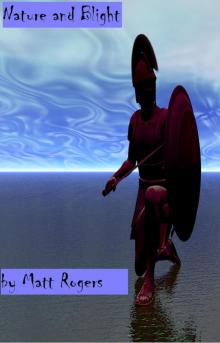 Nature and Blight
Nature and Blight The Wolves of Third Clan
The Wolves of Third Clan Ghosts
Ghosts Bear
Bear The Will Slater Series Books 1-3
The Will Slater Series Books 1-3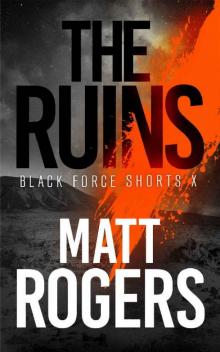 The Ruins
The Ruins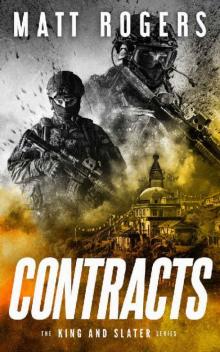 Contracts
Contracts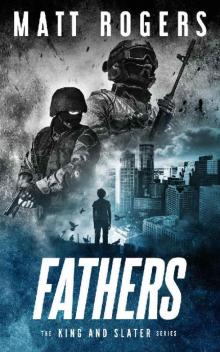 Fathers
Fathers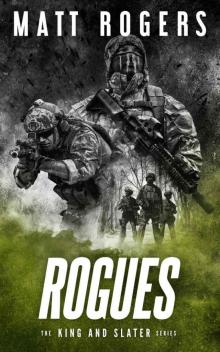 Rogues: A King & Slater Thriller
Rogues: A King & Slater Thriller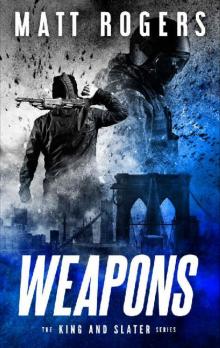 Weapons
Weapons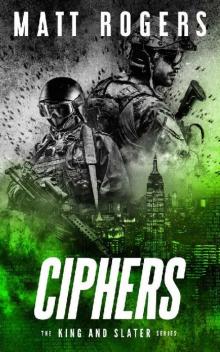 Ciphers
Ciphers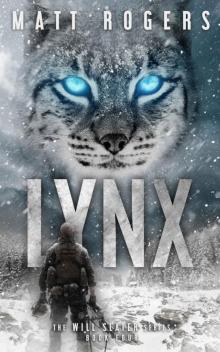 Lynx
Lynx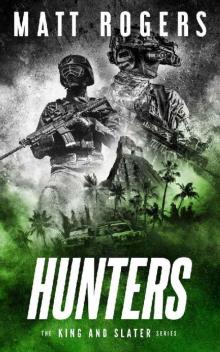 Hunters
Hunters Of Superior Design
Of Superior Design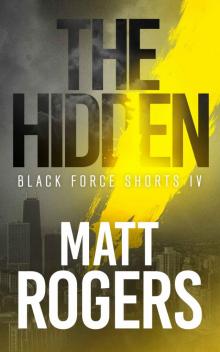 The Hidden: A Black Force Thriller (Black Force Shorts Book 4)
The Hidden: A Black Force Thriller (Black Force Shorts Book 4) Blood Money
Blood Money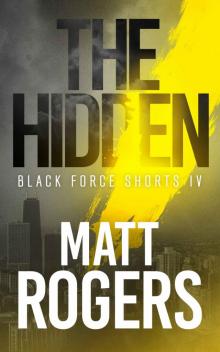 The Hidden_A Black Force Thriller
The Hidden_A Black Force Thriller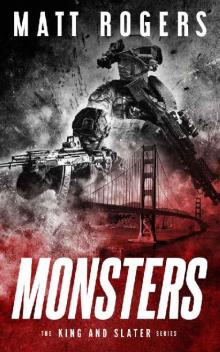 Monsters
Monsters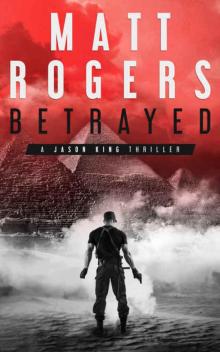 Betrayed: A Jason King Thriller (Jason King Series Book 4)
Betrayed: A Jason King Thriller (Jason King Series Book 4)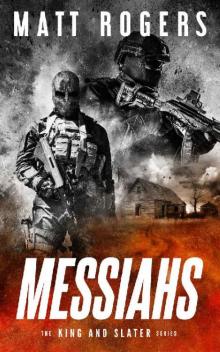 Messiahs
Messiahs The Wicked_A Black Force Thriller
The Wicked_A Black Force Thriller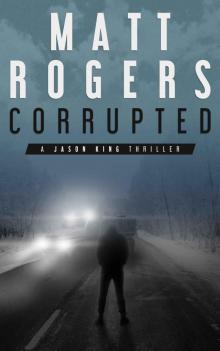 Corrupted: A Jason King Thriller (Jason King Series Book 5)
Corrupted: A Jason King Thriller (Jason King Series Book 5)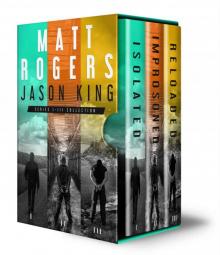 The Jason King Series: Books 1-3
The Jason King Series: Books 1-3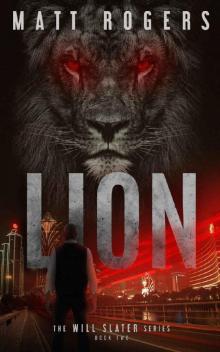 Lion
Lion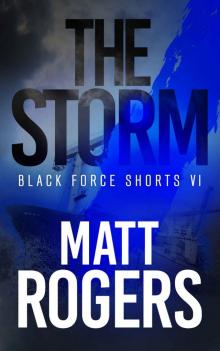 The Storm: A Black Force Thriller (Black Force Shorts Book 6)
The Storm: A Black Force Thriller (Black Force Shorts Book 6)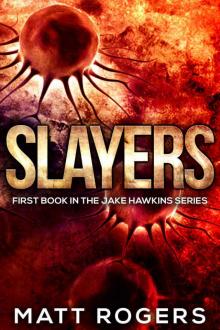 Slayers (Jake Hawkins Book 1)
Slayers (Jake Hawkins Book 1)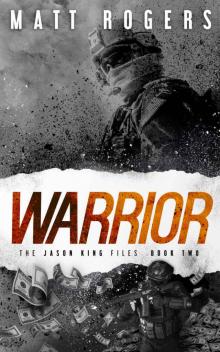 Warrior: A Jason King Thriller (The Jason King Files Book 2)
Warrior: A Jason King Thriller (The Jason King Files Book 2)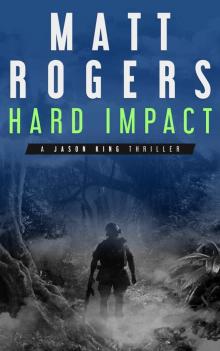 Hard Impact: A Jason King Operation (Jason King Series Book 0)
Hard Impact: A Jason King Operation (Jason King Series Book 0) The Wicked: A Black Force Thriller (Black Force Shorts Book 7)
The Wicked: A Black Force Thriller (Black Force Shorts Book 7)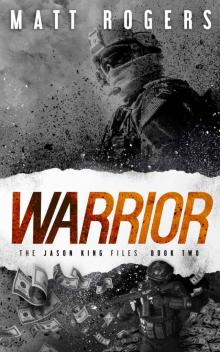 Warrior_A Jason King Thriller
Warrior_A Jason King Thriller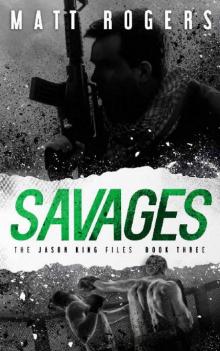 Savages: A Jason King Thriller (The Jason King Files Book 3)
Savages: A Jason King Thriller (The Jason King Files Book 3)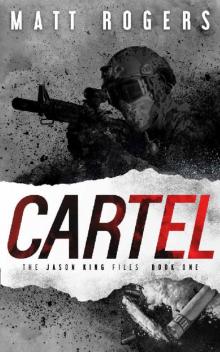 Cartel: A Jason King Thriller (The Jason King Files Book 1)
Cartel: A Jason King Thriller (The Jason King Files Book 1)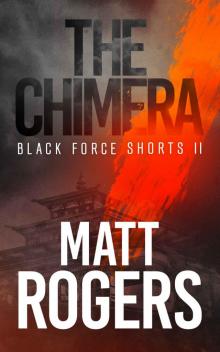 The Chimera_A Black Force Thriller
The Chimera_A Black Force Thriller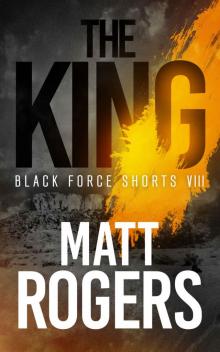 The King: A Black Force Thriller (Black Force Shorts Book 8)
The King: A Black Force Thriller (Black Force Shorts Book 8)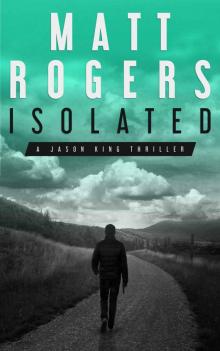 Isolated: A Jason King Thriller (Jason King Series Book 1)
Isolated: A Jason King Thriller (Jason King Series Book 1) The Victor: A Black Force Thriller (Black Force Shorts Book 1)
The Victor: A Black Force Thriller (Black Force Shorts Book 1)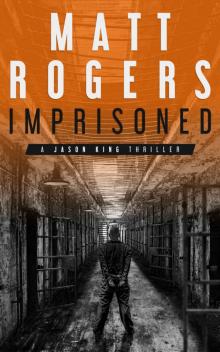 Imprisoned: A Jason King Thriller (Jason King Series Book 2)
Imprisoned: A Jason King Thriller (Jason King Series Book 2)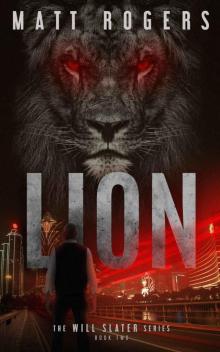 Lion: A Will Slater Thriller (Will Slater Series Book 2)
Lion: A Will Slater Thriller (Will Slater Series Book 2)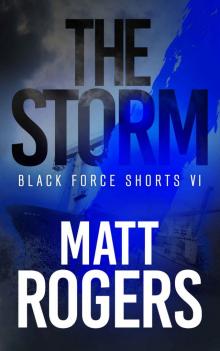 The Storm_A Black Force Thriller
The Storm_A Black Force Thriller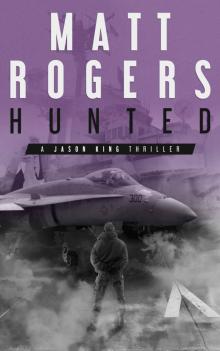 Hunted: A Jason King Thriller (Jason King Series Book 6)
Hunted: A Jason King Thriller (Jason King Series Book 6)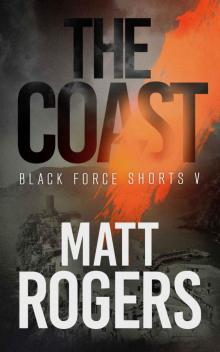 The Coast: A Black Force Thriller (Black Force Shorts Book 5)
The Coast: A Black Force Thriller (Black Force Shorts Book 5)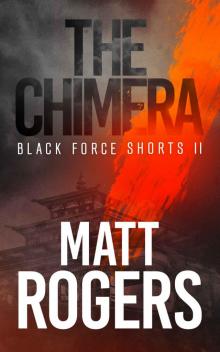 The Chimera: A Black Force Thriller (Black Force Shorts Book 2)
The Chimera: A Black Force Thriller (Black Force Shorts Book 2)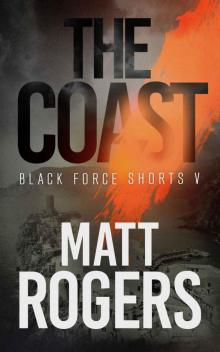 The Coast_A Black Force Thriller
The Coast_A Black Force Thriller